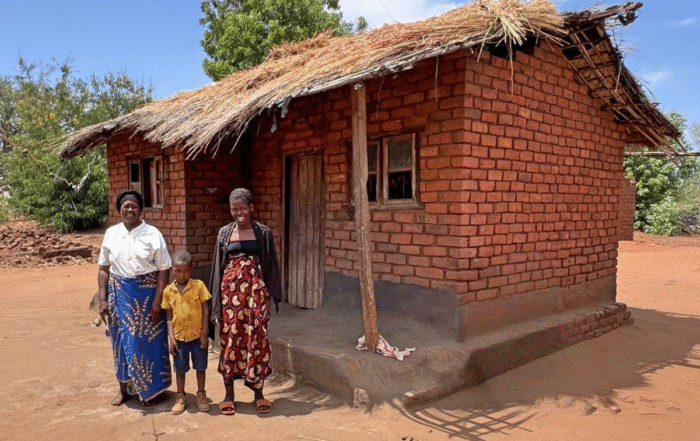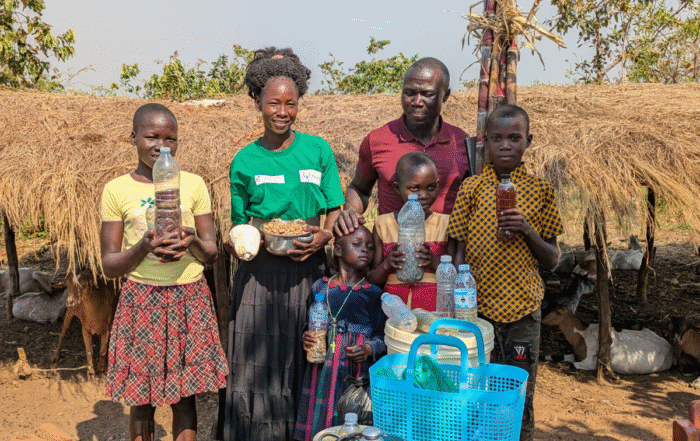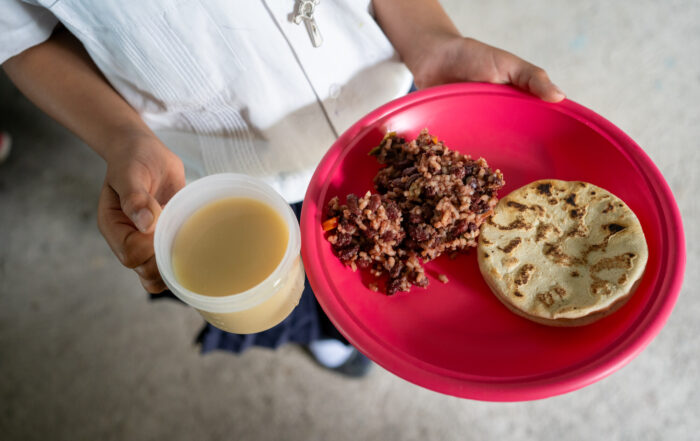Embracing God’s love amid hunger and drought
October 28, 2024
Embracing God’s love amid hunger and drought
October 28, 2024
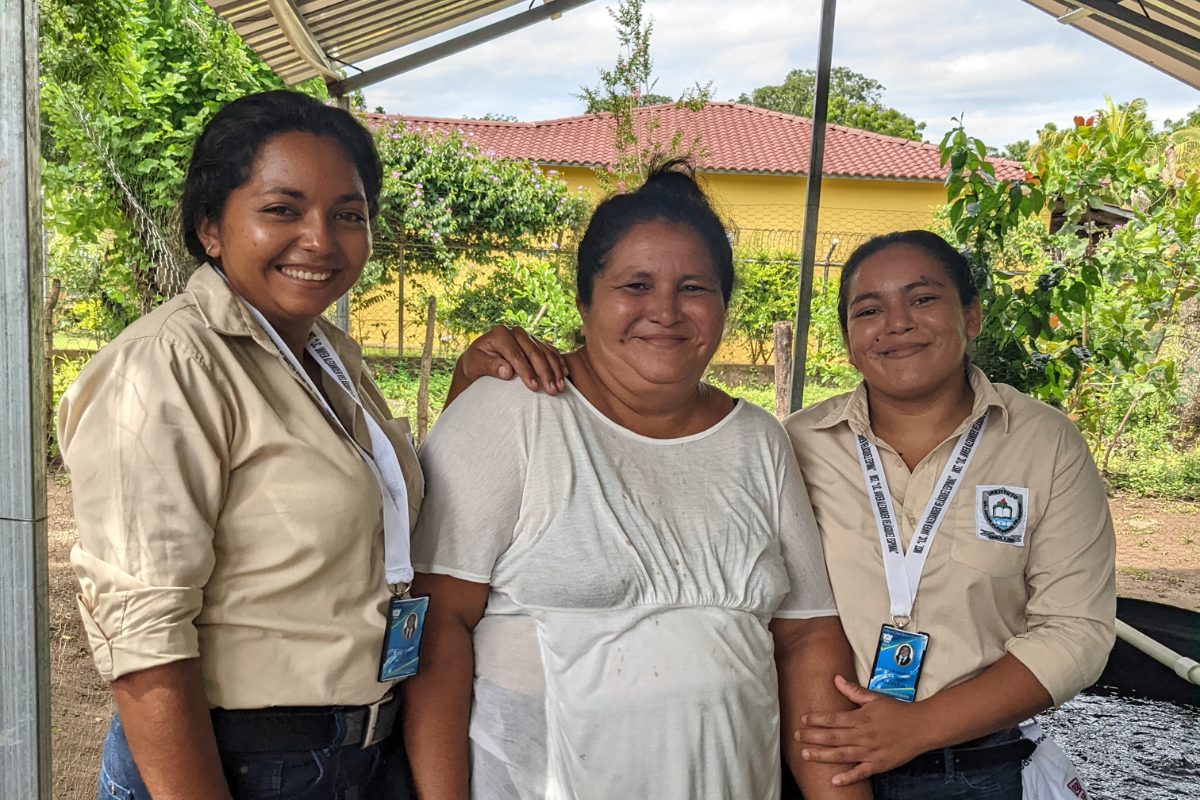
“God only gives us his love.”
If you have been supporting World Renew for a few years, you may have read about Maira Guelpa at least once or twice. She has been participating in World Renew programming for three decades now. World Renew works to equip communities with the training and resources to sustainably overcome hunger and is committed to working with communities until they become self-reliant. Maira not only represents World Renew’s commitment to standing with communities, but she is also the epitome of the self-reliance that we pray all participants in our programs will achieve.
Maira lives in Azacualpa in Honduras, in a region along the Central American Pacific coast often referred to as the Dry Corridor. The landscape tells the tale of why the region has earned this name. Over the last two decades, extreme weather conditions have left the soil dry, and the vegetation withered.
In Honduras, 72 percent of families depend on agriculture to earn a living. As a lack of rain results in less bountiful harvests, many families have been torn apart. People leave their spouses and children behind to seek employment abroad. “Many people stop in Azacualpa on their journey of migration from Honduras, but no one stays,” says Maira. People need to be able to produce food to survive, but how do they grow enough in drought-weary soil?
When World Renew’s local partner Diaconia Nacional first met Maira, she was pregnant and lacked the nutrition required for a healthy pregnancy. Gratefully, Maira joined our maternal and newborn nutrition programs. They were able to provide vitamins and other essentials that Maira needed to carry her daughter, Marie Carmen, to full term.
Through World Renew and Diaconia Nacional, Maira was also introduced to aquaponics. Aquaponics is a sustainable production system that allows families to grow food year-round for their own use and to sell to generate income. The term aquaponics originates from the two words aquaculture (the growing of fish in a closed environment) and hydroponics (the growing of plants in water). Simply put, fish waste makes the perfect fertilizer for plants to grow. The plants then assimilate nitrates helping to keep the water clean for the fish.
Aquaponics systems do not require extensive land, are inexpensive to set up, and use approximately 90 percent less water than conventional farming. The water used is recycled, so it is rarely changed or discarded. Aquaponics systems also do not require fertilizers, which helps keep the cost of growing food down. Additionally, plants grow faster in aquaponics systems because they can access nutrient-rich water 24 hours a day.
When World Renew introduced Maira’s community to aquaponics, she says her neighbours laughed at the idea of growing food in a small space with limited water. But today, “We have access to the infrastructure that allows us to have fresh and good quality vegetables all the time, because this is a system that does not require soil or fertilizer. We simply need water, fish, and plants,” Maira says with a smile. “It has come to improve our quality of life because now we have a balanced diet . . . We have meat from the fish that we’ve raised ourselves alongside vegetables: cucumbers, chili, avocado, cilantro, beans . . . well, many, many vegetables.” Discover how aquaponics systems are helping families in Honduras.
Maria and her daughter Marie Carmen, as well as Maira’s younger daughter who is also named Maira, work diligently to keep their aquaponics system running. They also help World Renew and Diaconia Nacional introduce other families in their community to aquaponics. Maira has become a community leader. She believes that it is important to help others. “I tell everyone, it is not the same to serve as it is to be served. A good leader serves but does not wait to be served,” she says.
Maira and her daughters have developed their aquaponics system further by adding a small water tank where they breed fish to sell to families starting aquaponics systems. Maira says they are always looking for ways to improve the system. “We are learning day by day, we are being innovative,” she says. “I make my own fish food using corn, soy, wheat, and oats. It turns out the same as the one I used to buy in the market.”
Maira gives God the credit for her innovativeness and resilience and is grateful to World Renew and Diaconia Nacional for helping her grow in faith. She shares, “I believe I have learned the way to have faith in God because I have surrounded myself with people who have not spoken to me about anything other than the compassion and love of Christ.” Her ever-present smile widens as she continues, “God only gives us his love.”
November 3 is World Hunger Sunday. Through your gifts you can help World Renew equip families with the training and resources needed to journey to food security and self-reliance. Thank you for extending God’s love so communities struggling with hunger can look to the future with hope and faith in his abundance.
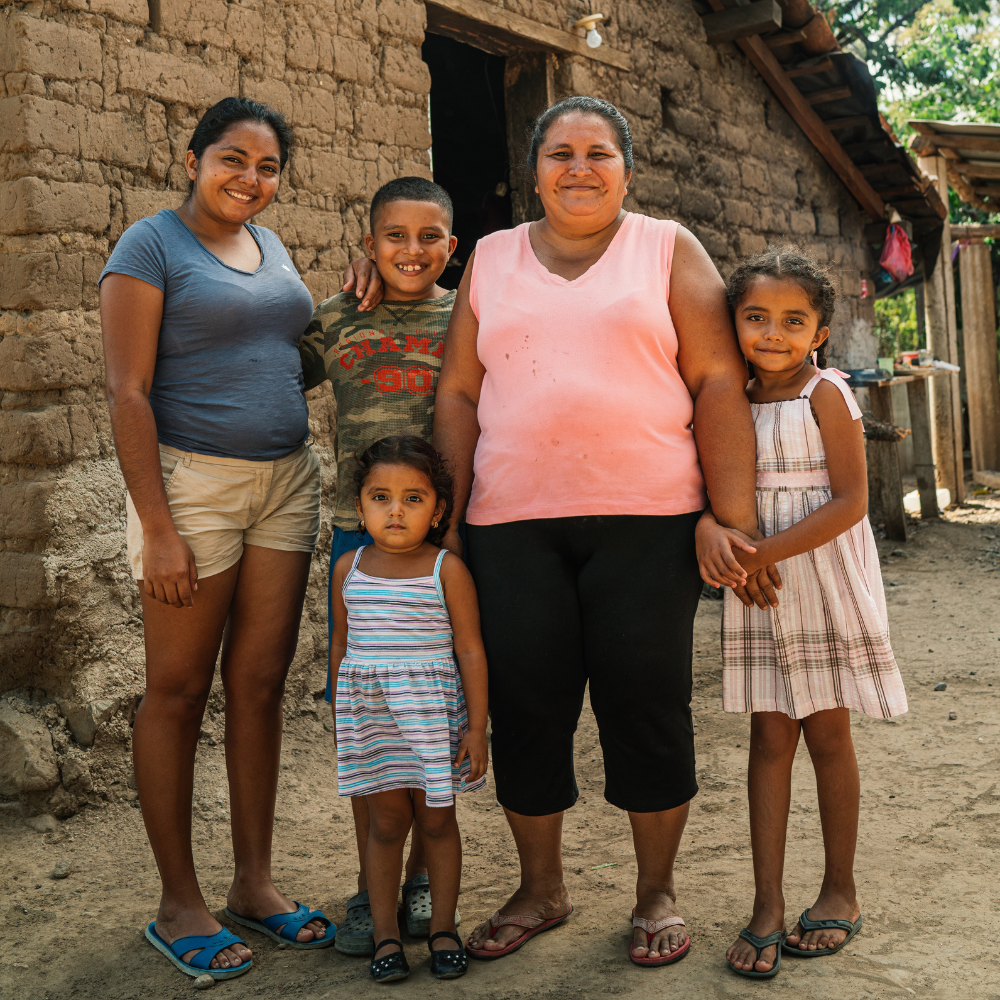
“God only gives us his love.”
If you have been supporting World Renew for a few years, you may have read about Maira Guelpa at least once or twice. She has been participating in World Renew programming for three decades now. World Renew works to equip communities with the training and resources to sustainably overcome hunger and is committed to working with communities until they become self-reliant. Maira not only represents World Renew’s commitment to standing with communities, but she is also the epitome of the self-reliance that we pray all participants in our programs will achieve.
Maira lives in Azacualpa in Honduras, in a region along the Central American Pacific coast often referred to as the Dry Corridor. The landscape tells the tale of why the region has earned this name. Over the last two decades, extreme weather conditions have left the soil dry, and the vegetation withered.
In Honduras, 72 percent of families depend on agriculture to earn a living. As a lack of rain results in less bountiful harvests, many families have been torn apart. People leave their spouses and children behind to seek employment abroad. “Many people stop in Azacualpa on their journey of migration from Honduras, but no one stays,” says Maira. People need to be able to produce food to survive, but how do they grow enough in drought-weary soil?
When World Renew’s local partner Diaconia Nacional first met Maira, she was pregnant and lacked the nutrition required for a healthy pregnancy. Gratefully, Maira joined our maternal and newborn nutrition programs. They were able to provide vitamins and other essentials that Maira needed to carry her daughter, Marie Carmen, to full term.
Through World Renew and Diaconia Nacional, Maira was also introduced to aquaponics. Aquaponics is a sustainable production system that allows families to grow food year-round for their own use and to sell to generate income. The term aquaponics originates from the two words aquaculture (the growing of fish in a closed environment) and hydroponics (the growing of plants in water). Simply put, fish waste makes the perfect fertilizer for plants to grow. The plants then assimilate nitrates helping to keep the water clean for the fish.
Aquaponics systems do not require extensive land, are inexpensive to set up, and use approximately 90 percent less water than conventional farming. The water used is recycled, so it is rarely changed or discarded. Aquaponics systems also do not require fertilizers, which helps keep the cost of growing food down. Additionally, plants grow faster in aquaponics systems because they can access nutrient-rich water 24 hours a day.
When World Renew introduced Maira’s community to aquaponics, she says her neighbours laughed at the idea of growing food in a small space with limited water. But today, “We have access to the infrastructure that allows us to have fresh and good quality vegetables all the time, because this is a system that does not require soil or fertilizer. We simply need water, fish, and plants,” Maira says with a smile. “It has come to improve our quality of life because now we have a balanced diet . . . We have meat from the fish that we’ve raised ourselves alongside vegetables: cucumbers, chili, avocado, cilantro, beans . . . well, many, many vegetables.” Discover how aquaponics systems are helping families in Honduras.
Maria and her daughter Marie Carmen, as well as Maira’s younger daughter who is also named Maira, work diligently to keep their aquaponics system running. They also help World Renew and Diaconia Nacional introduce other families in their community to aquaponics. Maira has become a community leader. She believes that it is important to help others. “I tell everyone, it is not the same to serve as it is to be served. A good leader serves but does not wait to be served,” she says.
Maira and her daughters have developed their aquaponics system further by adding a small water tank where they breed fish to sell to families starting aquaponics systems. Maira says they are always looking for ways to improve the system. “We are learning day by day, we are being innovative,” she says. “I make my own fish food using corn, soy, wheat, and oats. It turns out the same as the one I used to buy in the market.”
Maira gives God the credit for her innovativeness and resilience and is grateful to World Renew and Diaconia Nacional for helping her grow in faith. She shares, “I believe I have learned the way to have faith in God because I have surrounded myself with people who have not spoken to me about anything other than the compassion and love of Christ.” Her ever-present smile widens as she continues, “God only gives us his love.”
November 3 is World Hunger Sunday. Through your gifts you can help World Renew equip families with the training and resources needed to journey to food security and self-reliance. Thank you for extending God’s love so communities struggling with hunger can look to the future with hope and faith in his abundance.


